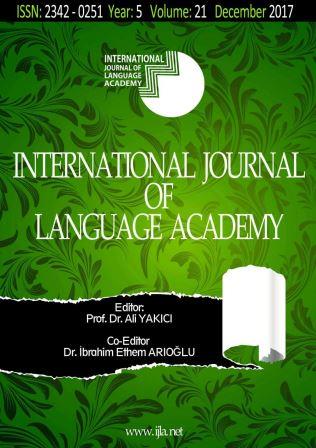Author :
Abstract
Bu çalışmada ortaokul, ortaöğretim ve üniversite öğrencilerinin cinsiyetlerine ve öğrenim düzeylerine göre gençlik dili kullanımları incelenmiştir. Gençlik dönemi, gençlerin çok yönlü değişim yaşadığı hassas bir süreç olarak tanımlanabilmektedir. Birçok açıdan değişimin yaşandığı bu dönemden dil de etkilenmektedir. Gençler, içinde bulundukları dönemin etkisiyle dikkat çekmek ve farklı olduklarını ortaya koymak için kendi aralarında konuştukları eğlenceli, popüler, samimi, kuralsız bir dil ortaya çıkarmaktadır. Toplumdilbilimsel yaklaşımla bir dil değişkesi olarak kabul edebileceğimiz gençlik dili, ölçünlü dilden farklı olarak gençlerin kendi aralarında oluşturdukları özel dil kullanımlarıdır.Öğrencilerin gençlik dili kullanımlarını belirleme amaçlı yapılan bu araştırma, kesitsel yaklaşım kullanılan betimsel bir çalışmadır. Araştırmanın çalışma grubunu, 2016-2017 Eğitim-Öğretim yılında Antalya ili merkez ilçelerinde öğrenim gören 7. ve 8. sınıf 20 ortaokul öğrencisi, 11. ve 12. sınıf 20 ortaöğretim öğrencisi ile Akdeniz Üniversitesi lisans programlarında öğrenim gören 20 üniversite öğrencisi oluşturmaktadır. Çalışma grubu 30 kız ve 30 erkek öğrenci olmak üzere toplam 60 gönüllü öğrenciden oluşmaktadır. Çalışma grubundaki katılımcılar, öğrenim düzeylerine ve cinsiyetlerine göre eşit sayıda seçilmiştir. Araştırmanın verileri, görüşme yöntemi kullanılarak toplanmıştır. Verilerin analizi sırasında içerik analizi tekniğinden yararlanılmıştır. Araştırma bulguları incelendiğinde, gençlik dili kullanımlarının yaşa bağlı öğrenim düzeylerine göre farklılık gösterdiği görülmüştür. Araştırma sonuçlarında öğrencilerin büyük bir bölümü, gençlik dilini kullandığını, bu dil değişkesinin Türkçe için bir tehdit olmadığını, sosyal medyada sıkça kullanılan popüler bir dil olduğunu bildirmişlerdir. Ayrıca araştırmanın sonuçları arasında gençlerin konuşma ve yazı dilinde kısaltmalara yer verdikleri, yeni sözcükler türettikleri, yalnızca kendi sosyal gruplarının anlayabileceği kalıplaşmış ifadeler kullandıkları görülmüştür.
Keywords
Abstract
In this study, the usages of youth language have been studied according to the levels of education and the genders of the secondary school, high school and university students. Youth can be defined as a critical process in which the young undergo versatile changes. Language is also influenced by this period when many changes are experienced in many aspects. The young produce an enjoyable, popular, sincere and informal language spoken among themselves to draw attention and show that they are different due to the period in which they live. Apart from standard language, youth language which we can sociolinguistically regard as a language variation are special language usages which the young produce among themselves.This study carried out to identify the students’ youth language examples of usage is a descriptive study in which cross-sectional approach is used. The study group of the research consists of twenty secondary school students, twenty high school students who study at the central districts in Antalya Province in the academic year of 2016-2017 and twenty students who study at Akdeniz University. The study group contains totally sixty volunteer students, thirty of whom are males and thirty of whom are females. The participants in the study group have been equally selected according to the levels of education and genders. When choosing the study group, maximum variation sampling technique that is one of the purposive sampling methods has been used. The survey data have been collected by using the method of interview. Content analysis technique has been utilized during the analysis of data. When the research findings are studied, it has been observed that the usage of youth language have differed according to the levels of education depending on age. As a result of the survey, most of the students have acknowledged that they use youth language, this language variation does not pose a threat to Turkish Language and it is a popular language used frequently on social media. Additionally, as a result of the research it has been observed that the young apply to abbreviations in spoken and written language, neologize and use stereotyped expressions which only their social groups can understand.
